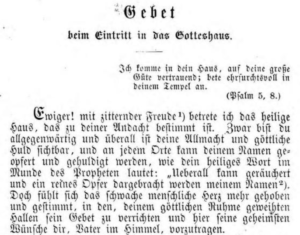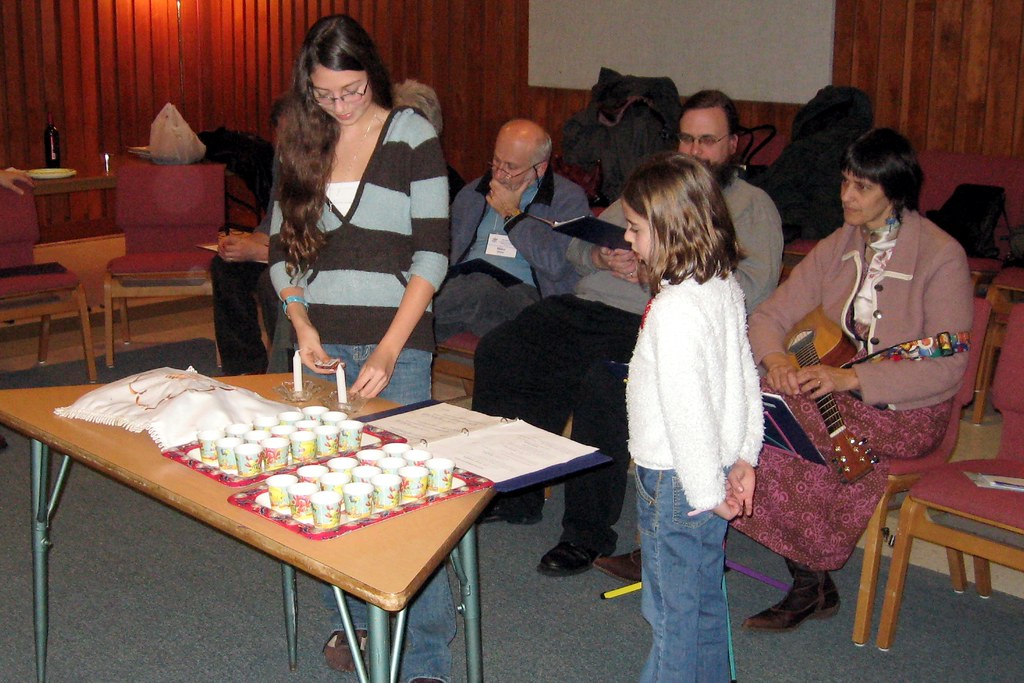| Source (German) | Translation (English) |
|---|---|
Ich komme in dein Haus, auf deine große Güte vertrauend; bete ehrfurchtsvoll in deinem Tempel an. (Psalm 5, 8.) |
I come into your house, trusting in your great goodness; I worship reverently in your Temple. (Psalms 5:8) |
Ewiger! mit zitternder Freude[1] Nach dem Ausdrucke des Psalmisten: וְגִילוּ בִרְעָדָה (freut euch mit Zittern. Psalm 2, 11.) betrete ich das heilige Haus, das zu deiner Andacht bestimmt ist. Zwar bist du allgegenwärtig und überall ist deine Allmacht und göttliche Huld sichtbar, und an jedem Orte kann deinem Namen geopfert und gehuldigt werden, wie dein heiliges Wort im Munde des Propheten lautet: “Ueberall Kann geräuchert und ein reines Opfer dargebracht werden meinem Namen” (Maleachi 1, 11). Doch fülht sich das schwache menschliche Herz mehr gehoben und gestimmt, in den, deinem göttlichen Ruhme geweihten Hallen sein Gebet zu verrichten und hier seine geheimsten Wünsche dir, Vater im Himmel, vorzutragen. |
Eternal! with trembling joy[2] According to the expression of the psalmist: וְגִילוּ בִרְעָדָה (Rejoice with trembling. Psalms 2:11.) I enter the holy house appointed for your worship. True, you are omnipresent, and everywhere your omnipotence and divine favor are apparent, and in every place sacrifice and homage may be offered to your name, as is your holy word in the mouth of the prophet, “Everywhere may incense be burned and a pure sacrifice offered to my name (Malachi 1:11). But the weak human heart feels further uplifted and tuned to perform its prayer in these halls consecrated to your divine glory and to present here its most secret desires to you, Father in heaven. |
Ja, im Vertrauen auf deine ewige Huld, o Ewiger, betrete ich dein Haus, neige mich, von Gottesfurcht erfüllt, vor dir an der heiligen Stätte deiner Herrlichkeit. O würdige mich, mein Gebet, das ich dir treugesinnt vorzutragen mich anschicke, wohlgefällig aufzunehmen, als ein Opfer, das vom liebeglühenden Altare meines Herzens zu dir emporsteigt. |
Indeed, trusting in your eternal mercy, O Eternal One, I enter your house; filled with divine reverence, I bow before you in the holy place of your glory. O dignify me to receive my prayer, which I faithfully prepare to offer to you, to receive with pleasure, as a sacrifice that ascends to you from the altar of love in my heart. |
Deiner Allgüte vertrauend weicht die Furcht von mir nach und nach, und ich nähere mich dir, wie ein Kind vor den gütigen Vater tritt, mit Zuversicht, und hebe mein Herz wie meine Hände flehend zu dir empor. O merke auf die geheimste Regung meiner Brust und erhöre mein Gebet, mein Hort und mein Erlöser! |
Trusting in your all-goodness, fear gradually recedes from me, and I approach you as a child approaches a kind father, with confidence, and lift my heart like my hands imploringly up to you. O take note of the most secret stirrings of my breast and hear my prayer, my refuge and my redeemer! |
“Gebet beim Eintritt in das Gotteshaus” was written by Meir Letteris and published in his anthology of teḥinot, תחנוני בת יהודה (Taḥnunei bat Yehudah) Andachtsbuch für israelitische Frauenzimmer…. In the 1846 and 1857 printings, it appears on p. 1.
This transcription was made by Emily Kesselman. The translation presented here was derived by running this transcription through the translation tools of DeepL and Google and proofreading the output. –Aharon Varady
Source(s)

Notes

“Gebet beim Eintritt in das Gotteshaus | Prayer upon entering the house of God, by Dr. Meïr Letteris (1846)” is shared through the Open Siddur Project with a Creative Commons Public Domain Dedication 1.0 Universal license.










Leave a Reply